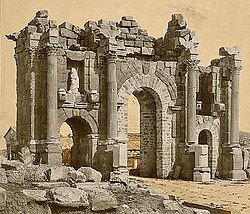Cohors Breucorum

Cohors Breucorum was an important Roman castrum located in western Mauretania Caesariensis.
History[]
The castrum was created under Septimius Severus emperor in the third century. It served as a Roman station and fort on a new military road called "Nova Praetentura", that was created in order to expand to the south the Roman controlled territories in western Mauretania and connect this region to Volubilis[1]
Under the reign of Septimius Severus, presumably in 201 AD, the Romans occupied vast territories in the Oran region, moving the limes established by the Antonines to the south and creating a new frontier line with a new military road: the "Nova praetentura".....this road, connecting with the previous frontier from Rapidum, including the Ouarsenis and the mountains of Frenda and, through the urban centers of Usinaza (Saneg), Cohors Breucorum (Takhemaret), Altava (Ouled-Mimoun), Pomaria (Tlemcem), progressively approached westward to the Mediterranean coast, only a distance of about thirty kilometers from Numerum Syrorum (Lalla Maghnia)M. A. Ruiu [2]
The name was given because it was under the control of the Cohors of the "Breuci", a tribe from ancient Illyria, stationed there (like the cohors from Roman Syria were stationed in nearby Numerus Syrorum (Maghnia).
The castrum had a small "vicus" located nearby, that had nearly 1500 inhabitants and that survived for a few centuries after the removal of the Roman legionaries, probably at the end of the third century). With the Arab invasion in the seventh century the "vicus" disappeared.
Notes[]
Bibliography[]
- Bowna, Alan. The Cambridge Ancient History: Volume 12, The Crisis of Empire, AD 193-337. Cambridge university Press. Cambridge, 2005
- Ruiu, Maria Antonietta. La Cohors II Sardorum ad Altava (Ouled-Mimoun, Algeria). Universita' degli Studi di Sassari. Sassari, 2012
- Villaverde Noé, Vega. Tingitana en la antigüedad tardía, siglos III-VII: autoctonía y romanidad en el extremo occidente mediterráneo. Ed. Real Academia de la Historia. Madrid, 2001 ISBN 8489512949, 9788489512948
See also[]
- Archaeological sites in Algeria
- Roman towns and cities in Mauretania Caesariensis
